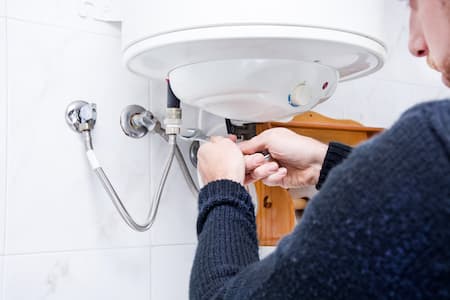Usual Heater Complications
Usual Heater Complications
Blog Article
We've uncovered this post pertaining to Water Heaters Problems down the page on the web and reckoned it made perfect sense to share it with you on this site.

Picture beginning your day without your routine hot shower. That currently establishes a bad tone for the rest of your day.
Every home needs a dependable water heater, however just a few recognize exactly how to take care of one. One easy method to maintain your water heater in leading form is to check for faults regularly as well as repair them as quickly as they show up.
Remember to shut off your hot water heater prior to smelling about for faults. These are the water heater faults you are more than likely to run into.
Water too hot or too cold
Every water heater has a thermostat that identifies how hot the water gets. If the water coming into your house is as well hot in spite of setting a convenient maximum temperature, your thermostat might be faulty.
On the other hand, also cold water might be because of a stopped working thermostat, a broken circuit, or improper gas flow. As an example, if you use a gas water heater with a busted pilot light, you would obtain cold water, even if the thermostat remains in best problem. For electric heating units, a blown fuse might be the wrongdoer.
Insufficient hot water
Water heaters come in lots of dimensions, relying on your warm water needs. If you run out of hot water before every person has had a bath, your water heater is too small for your family size. You should consider installing a larger water heater container or opting for a tankless water heater, which takes up less area and also is more durable.
Strange sounds
There are at the very least five kinds of noises you can learn through a water heater, yet the most usual analysis is that it's time for the water heater to retire.
Firstly, you must be familiar with the typical sounds a hot water heater makes. An electrical heater may seem different from a gas-powered one.
Popping or banging noises normally indicate there is a piece of sediment in your storage tanks, as well as it's time to clean it out. On the other hand, whistling or hissing noises may simply be your valves allowing some stress off.
Water leakages
Leakages might come from pipelines, water links, shutoffs, or in the worst-case situation, the container itself. Gradually, water will certainly corrode the container, and discover its escape. If this happens, you need to change your water heater immediately.
Nonetheless, prior to your modification your entire container, make certain that all pipes are in location which each shutoff functions flawlessly. If you still need help determining a leak, call your plumber.
Rust-colored water
Rust-colored water indicates among your hot water heater parts is rusted. It could be the anode rod, or the tank itself. Your plumber will certainly have the ability to determine which it is.
Lukewarm water
No matter just how high you established the thermostat, you won't obtain any type of hot water out of a heating unit well past its prime. A water heater's performance might reduce with time.
You will likewise obtain lukewarm water if your pipelines have a cross link. This implies that when you activate a faucet, warm water from the heating unit moves in together with routine, cold water. A cross link is simple to area. If your warm water taps still follow shutting the water heater valves, you have a cross link.
Discoloured Water
Rust is a significant source of filthy or discoloured water. Corrosion within the water container or a stopping working anode rod might cause this discolouration. The anode pole secures the storage tank from rusting on the within and should be examined yearly. Without a pole or a correctly operating anode rod, the hot water swiftly wears away inside the container. Contact an expert hot water heater technician to figure out if changing the anode pole will certainly take care of the issue; otherwise, replace your water heater.
Final thought
Ideally, your water heater can last 10 years prior to you require an adjustment. However, after the 10-year mark, you might experience any of these faults extra consistently. Now, you must add a brand-new water heater to your spending plan.
How To Troubleshoot 3 Common Water Heater Problems in Twin Cities
The Water Heater Is Leaking
A leaky cold water inlet valve A loose pipe fitting A leaky temperature and pressure relief valve A corroded anode rod A cracked tank Turn Off Your Water Heater:
Shut off your gas water heater by turning the gas valve on the unit to the “OFF” position. Shut off your electric water by switching its power off at your electrical panel. Look for a two-pole breaker labeled “water heater” and turn it to the “OFF” position. Move the ball valve connected to the water heater to be perpendicular to the piping at a 90° angle. Look for the Leak:
Depending on whether the water is coming from the tank's top or bottom, you’ll want to look for the leak in different locations.
If the leak comes from the top of the tank, carefully look for water escaping from the cold water inlet valve or loose pipe fittings. Rusted hot and cold water valves can have loose connections with the tank, with water leaking out of them.
https://mspplumbingheatingair.com/blog/how-to-troubleshoot-3-common-water-heater-problems
As a passionate person who reads on Common Problems with Your Home Water Heater, I assumed sharing that excerpt was a great idea. You should set aside a second to promote this blog entry if you enjoyed reading it. Thanks a lot for your time. Don't forget to come by our blog back soon.
Urgent plumbing? Call us. Report this page